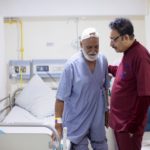New Delhi, August 07, 2018 :
Around the Nation
- If India remains committed to achieving 100% coverage in terms of safe sanitation services by October 2019, as many as 3,00,000 deaths caused due to diarrheal disease and protein-energy malnutrition since the country launched the Swachh Bharat Mission in 2014 can be averted, the WHO said. As per calculations, if all sanitation services are used, the initiative could result in over 14 million more years of healthy life in the period measured, with the benefits accruing yearly thereafter.
- Varanasi and Delhi are among 14 Indian cities dubbed most polluted by the WHO because of the air quality measured in terms of PM 2.5. Other cities in this category are: Jaipur, Jodhpur, Srinagar, Kanpur, Faridabad, Gaya, Patna, Lucknow, Agra, Gurgaon, Patiala and Muzaffarpur. Only six other cities of other countries fall in this category in the WHO list.
- The CPI(M) Politburo has urged the Government to withdraw the “regressive” National Medical Commission Bill and Higher Education Commission of India Bill.
- A parliamentary panel has asked the Health Ministry to take necessary steps to speed up the process of establishing and linking anti-retroviral treatment centres for the HIV-infected across the country. This will provide consistent access to “affordable and efficacious” medication regime for the treatment of HIV positive patients (The Committee on Petitions on the Ministry of Health and Family Welfare).
Around the globe
- The prevalence of aspirin intolerance is around 5 to 6%. Up to 20% of the asthmatic population is sensitive to aspirin and other nonsteroidal anti-inflammatory drugs (NSAIDs) and present with a triad of rhinitis, sinusitis, and asthma when exposed to the offending drugs. This syndrome is referred to as aspirin-induced asthma (AIA).
- Protecting vulnerable people in eastern Democratic Republic of the Congo (DRC) from the latest Ebola Virus outbreak is going to be “very, very complex”, given the huge logistical challenges and ongoing conflict there, said the World Health Organization (WHO).
- RQI or Resuscitation Quality Improvement is a self-directed, simulation-based performance and quality improvement program for health care professionals that offers “low-dose, high-frequency” hands-on learning sessions that provide vital CPR skills practice in 10 minutes every 90 days. It is co-developed by the American Heart Association and Laerdal Medical, which is a major, global medical equipment and medical training products manufacturer based in Stavanger, Norway.
- More than 100,000 people were sickened by food-related illness outbreaks that numbered 5760 between 2009 and 2015. Chicken was the most common food category responsible for outbreak-associated illnesses with 3,114 illnesses (12%)) followed by pork (2,670 (10%)) and seeded vegetables (2,572 (10%)). Fish (222 outbreaks (17%)) and dairy (136 (11%)) caused more individual outbreaks than any other food groups with chicken coming third in this category (123 (10%)). The pathogen-food category pairs that caused the most outbreak-associated illnesses were Salmonella in eggs (2,422 illnesses), Salmonella in seeded vegetables (2,203), and Salmonella in chicken (1,941) (CDC, Surveillance Summaries / July 27, 2018).
Dr KK Aggarwal
Padma Shri Awardee
Vice President CMAAO
President HCFI







